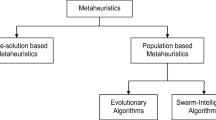Abstract
Traditional Evolutionary Algorithm (EAs) is based on the binary code, real number code, structure code and so on. But these coding strategies have their own advantages and disadvantages for the optimization of functions. In this paper a new Decimal Coding Strategy (DCS), which is convenient for space division and alterable precision, was proposed, and the theory analysis of its implicit parallelism and convergence was also discussed. We also redesign several genetic operators for the decimal code. In order to utilize the historial information of the existing individuals in the process of evolution and avoid repeated exploring, the strategies of space shrinking and precision alterable, are adopted. Finally, the evolutionary algorithm based on decimal coding (DCEAs) was applied to the optimization of functions, the optimization of parameter, mixed-integer nonlinear programming. Comparison with traditional GAs was made and the experimental results show that the performances of DCEAS are better than the tradition GAs.
Similar content being viewed by others
References
Zbyszek Michalewics. Evolutionary Algorithms for Constrained Optimization.International Workshop On Evolutionary Computation, 2000,4(1):1–11.
Pan Zheng-jun.Evolutionary Computation. Beijing: Tsinghua Press and Guangxi Science & Technology Press, 1998. 3–4.
Vose M D. Generalizing the Notion of Schema in Genetic Algorithms.Artifical Intelligence, 1991,50:563–565.
Byoung-Tak Zhang, Gerhard Paass. Convergence Properties of Incremental Bayesian Evolutionary Algorithms with Single Markov Chains.Proceedings of the 2000 Congress on Evolutionary Computation, July 16–19, California, USA, 2000, 234–245.
Melanie Mitchell.An Introduction to Genetic Algorithms. Cambridge: The MIT press, 1996, 15–27.
Zeng San-you, Kang Li-shan, Ding Li-xin, A New Method of Evolutionary Algorithms for Mixed-Integer Nonlinear Optimization Problem-Automatically Constracting Search Space to Optimal Solution.Journal of Wuhan University (Natural Science Edition), 2000,46(5):554–558.
Author information
Authors and Affiliations
Corresponding author
Additional information
Foundation item: Supported by the National Natural Science Foundation of China (No. 69703011)
Biography: Dong Wen-yong (1973-), male Ph. D. candidate, research direction: parallel algorithms, evolutionary computation, computer simulation.
Rights and permissions
About this article
Cite this article
Wen-yong, D., Yuan-xiang, L., Bo-jin, Z. et al. A new evolutionary algorithm based on the decimal coding. Wuhan Univ. J. Nat. Sci. 7, 150–156 (2002). https://doi.org/10.1007/BF02830304
Received:
Issue Date:
DOI: https://doi.org/10.1007/BF02830304




